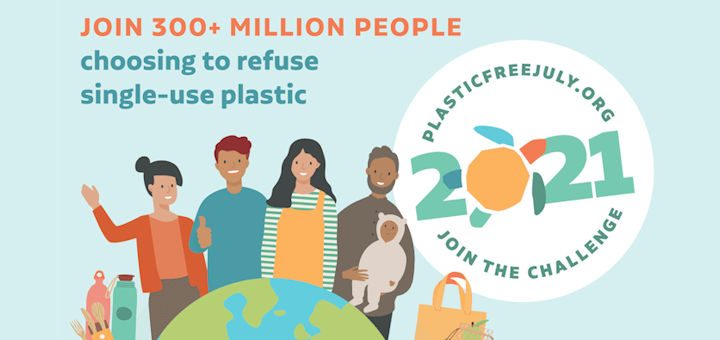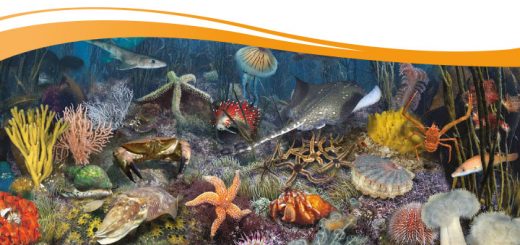
Plastic Free July, are we getting better?
Every year we get on board with Plastic Free July and try to encourage others to get involved. The Plastic Free July campaign has been running for 10 years with the first in 2011. The campaign was started by Rebecca Prince-Ruiz (the founder of the Plastic Free Foundation) and a small team in local government in Western Australia, since then it has become one of the most influential environmental campaigns in the world with an estimated 326 million people taking part in 2020!
The idea is to encourage people to try going plastic free for a month, or doing what they can to reduce their use of single use plastics. The plastic problem started right back when the first plastics were produced because those plastics are still with us, plastic can take hundreds of years to break down. There has been an explosion in the use of plastic over the last 30 years, with it being so cheap to produce and fit any need. This has lead to many items being made so cheaply that they can just be thrown away after their use. This plastic ends up everywhere, with much of it being washed into the ocean and breaking down into small microparticles which end up in the food chain. We’ve known for many years that plastic takes a long time to break down but it has only really come into the public eye in recent years as more people become aware of the problem, helped by campaigns like Plastic Free July. Until relatively recently there has been a lack of action by governments to tackle this problem but thanks to rising awareness of the problem they are being put under pressure to take action.

Plastic is now such an intrinsic part of our everyday lives, (you’d be amazed at some of the places you’ll find plastic) it is difficult to imagine how we can simply stop using it, you only have to take a trip to the supermarket to see how bad the problem is with plastic covering virtually all food products. An impossible task perhaps? Well it wasn’t always that way, we did manage to have fruit, veg and other food not wrapped in plastic and we did OK then! The Plastic Free July campaign is all about helping people make steps towards going plastic free, it is tough but taking the challenge can really open your eyes, get you using alternatives to plastic and start asking questions about the products that do still come wrapped in plastic.
So are attitudes and behaviors changing? Let’s look at some of the good news stories from the last few years.
Ban on Microbeads
This is one that shocked quite a lot of people when they found out what those little microbeads in their skin care products actually were! Like many items that have plastic in, we don’t know about it or just haven’t thought about it – check out our blog on surprising places to find plastic to see some more unexpected places you’ll find plastic. These tiny particles were supposed to help exfoliate skin and became standard in a lot of face washes, but did you know they even started appearing in toothpaste! Yep that’s right Colgate actually advertised them in helping to clean your teeth, so every time you brushed you teeth you’d be swallowing plastic, yum! The UK Government banned the use of microplastics in June 2018, it was thought that one single shower using rinse-off cosmetics with microbeads sent 100,000 microbeads down the drain into the ocean. Thankfully these entirely unnecessary pieces of plastic are no more.
Ban on Plastic Straws
An estimated 4.7 billion plastic straws were used in the UK every year before the ban. A ban was due to come into place in April 2020 however was pushed back to October of that year. Many bars and restaurants dropped a straw into drinks without even asking the customer and asking for no straw often resulted in getting strange looks from bar staff! Paper based straws are now being used in their place and many people are now carrying round their own reusable straws with them.
Ban on Plastic Cotton Buds
Along with plastic straws being banned, plastic cotton buds were also banned un the UK. Of course plastic free cotton buds are not a new thing, we’ve been selling Simply Gentle Organic cotton buds since we opened our virtual doors!
Charging for Plastic bags
Plastic bags in supermarkets have come with a 5p charge since October 2015, this had a huge impact on the numbers of plastic bags being used. In 2014 the average person in the UK used 140 single use carrier bags from supermarkets, this had fallen to just 4 a year! A charge is now being extended to all shops in the UK and the charge has gone up from 5p to 10p as of May 2021. This is just another example of how we had become used to what the supermarkets dictated for us, but cutting the use of plastic bags has been easy and it is second nature now for people to bring a reusable bag to the shops with them.
People Choosing Alternatives
Whilst the Government may have banned a limited number of single use plastic products, people have taken their own actions and stopped using plastic products and switching to plastic free alternatives. We’ve seen a huge increase in the popularity of bamboo toothbrushes, shampoo bars, reusable bottles and cups! There are so many options out there and easy switches to plastic free alternatives!

Greater Awareness
More and more people know of the extent of this problem through campaigns like Plastic Free July and also other campaigns, in particular the “Attenborough effect” certainly played a part with the airing of the Blue Planet II series which had a heavy focus on plastic pollution and let people see and understand the impact it has. Many other fantastic campaigns covering other areas of the plastic problem have arisen, such as Ella Daish’s campaign on plastic free periods.
What still needs doing?
A Broader Approach
Whilst banning particular products such as plastic straws is undeniably a positive thing, it does put the focus on a limited range of unnecessary plastic items when the problem is really a problem everywhere in industry. Something much broader is required to encourage businesses to move away from plastic, businesses use plastic because it is cheaper than the alternatives (we know first hand that eco friendly packaging is more expensive!), the only way this would change is if more businesses moved away from plastic making the alternatives cheaper, however this is unlikely to happen unless governments increase the cost of using plastics through taxation.
Keeping The Mindset
After making changes in your life and moving away from single use plastics it is easy to slip out of this just by accident, if you are out an about it may slip your mind if all of the options are put in front of you contain plastic. One very visible illustration of this is the pandemic, just think about how many disposable face masks you’ve seen lying on the floor. Reusable and plastic free face masks are cheap and readily available however the disposable plastic based masks are everywhere and given to you as an option all the time. Many people who would care about the plastic problem have bought these as perhaps this problem wasn’t the thing at the top of their minds. Fortunately as the pandemic has gone on more people do have reusable masks (perhaps as they have realized the longer the pandemic goes on, the more economical they become!) but sadly it’s not everyone, all you have to do is walk down the street and you are almost guaranteed to see one within a couple if minutes of leaving your house. So it’s important not to forget about the plastic problem when there appears to be more pressing problems.
Keep Buying Plastic Free And Refusing Plastic Products – And Lead by Example!
When you are at a restaurant, shop or takeaway for example and you are offered something plastic such as a plastic fork, just make a point of refusing it. There has been an explosion in plastic free alternatives to everyday products, there are so many switches you can make such as shampoo bars, reusable bottles and cups and bamboo toothbrushes! If you are already on board, then the next thing you can do is to encourage others, let them see you making choices, mention the alternatives to them, and even better if you are buying for other people go for the plastic free alternative and tell them why you chose that, hopefully they will then see how easy it is and continue to support plastic free!

Overall there still plenty to do and it can sometimes be disheartening to see the amount of plastic waste around but remember things are changing, they are getting better, think how you have changed your habits and remember other people may just take longer than you. If the industry starts changing, even those who seem not to care will start making plastic free choices by default!



